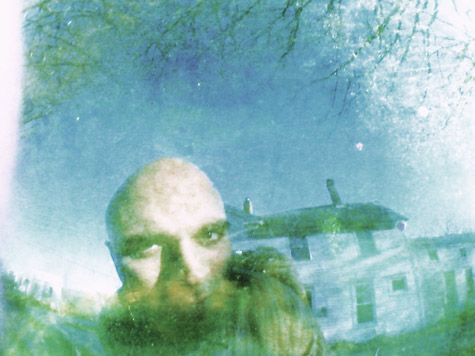
SEEN THROUGH A GLASS DARKLY: But definitely heard. |
The last time a voice hit me like this was the first time I heard Moses Atwood's "Seventh Sin," back in 2006. There are voices that are good, or good enough, and there are vocals that grab you and hold on tight and do so much work all on their own that the instruments that surround only need to serve as mood lighting. Jacob Augustine, recently returned to his home state of Maine from sojourns far west, has got himself a rare tool, and he sings right from his gut on his debut album, Harmonia, a disc that announces a new songwriting and performing force on the local scene (well, kind of new — known as Jacob McLaughlin, he's played in Donnybrook/Red Cloud Revival, which had a following up in the Bangor area for some time, fronted by brother Josh McLaughlin, and looks to have recently played a reunion show).
Like Atwood, Augustine's vocals aren't necessarily conservatory-pure, but his tone is immaculate and unique, high in the register, but with real timbre and power and not a falsetto and not at all fey. It's a tough wire to walk, but his songs are charged with rippling current and arranged with grace, and the result is a gripping and deep album.

Augustine's "Seventh Sin" is "Change," a heartbreaking, and maybe brilliant, tune of introspection and self-reprobation. His omni-present acoustic strum is the song's foundation, as it is for much of the album, with a piano providing the low-end gravity. The album is dedicated to "Sam," and I fear for what happened to him: "Hey Sam Robert Bailey/Where have you gone, my friend?/To where angel wings grow/I know that I'll see you again/Yeah, someday I'll find my snowbank in hell, for this life I'm living." It's a song of guilt and a desperate need for redemption. The paired harmonica and piano in the bridge evoke those ever-dueling angels and devils of our conscience nicely.
This song is all about the chorus, though, where Augustine's cadence and delivery breathe in and out like a bellows. "How can I change my ways today?" he begs. "How can I change my evil ways?/And how could I throw my devil down, down, down?/And how could I kick my demons around, around, around?"
Well, they say the devil is in the details, and to judge this album by the little things is to assume Augustine hasn't kicked the devil so far away after all. The warm electric guitar chirps that help him open the album with "American Mazy" preview one of the album's best lines: "I know that you lie to me/With that elastic way that you speak." The bowed bass and slide guitar crescendo on "Lucia," leading into the a cappella half-chorus that serves as middle and axle, before everything descends into a string-section dirge. Descending strings like a flock of starlings alighting open "High Water," lulling you to sleep for 45 seconds before Augustine charges in with "underwater bibles and homemade stars."
Augustine is storyteller and wordsmith, both, with lyrics that spiral back on themselves with moments of surreality and absurdity, but retain an ability to shape a scene. "High Water" is a Katrina tune, and a good one, but can function independently of that historic disaster. "Mazy" wishes it were 1950, but only with its lyrics.
There are times, though, when he seems to be trying to do too much. The 10 songs here push past 45 minutes and just one of them is under four minutes. A couple tunes could be tightened up. Sometimes the trumpet and saxophone, violin and harmonica make sense; sometimes they play the parts of intruders. As he develops a band here in Maine (this album was recorded elsewhere, with musicians who've not followed him here), it's likely his sound will evolve and refine. This is the kind of songwriter that musicians flock to, so I'm guessing he'll be able to pick and choose.
And it's becoming more and more likely he'll be able to find like-minded musicians willing to mix it up with important themes and messages. There's a string of great statement songs this year, and Augustine adds to them with "Suicide Bombs," a quick waltz that asks you to "come watch them bury young Johnny, dead," after he's signed up for the service because "his daddy was a drunk and his mama was lost." Wrapped in a pretty melody, with an ironic "la, la, la" bridge and mocking horns, it finishes with a trilled banjo like flickering life essence.
With innovative song structure, those pristine vocals, and a willingness to take chances, Jacob Augustine is a welcome addition to the local circuit and likely to take his place among its standouts.
Sam Pfeifle can be reached at sam_pfeifle@yahoo.com.
JACOB AUGUSTINE | Empire Dine and Dance | Jan 31